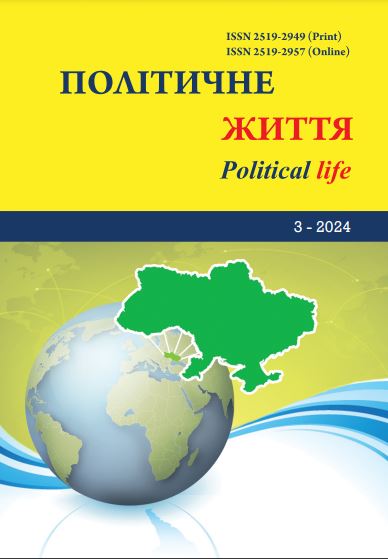Ideological dimension of modern political violence
DOI:
https://doi.org/10.31558/2519-2949.2024.3.8Keywords:
political violence, ideology, armed conflict, legitimization of violence, dehumanization, radicalization, political values and beliefsAbstract
The article is devoted to the study of the mechanisms of influence of ideological beliefs on the process of legitimization and justification of political violence. It has been established that ideology is an important element of political violence, which determines the nature and patterns of its use to achieve socio-political goals. It was determined that ideology is a set of systematized ideas, beliefs, norms, values and beliefs that determine the principles of political behavior of individuals. It has been proven that the common socio-political identity of supporters of a certain ideology increases the solidarity and readiness of individual groups to use physical coercion. This gives grounds for asserting that ideologies can influence the structure and goals of the subjects of violence, as well as ensure the process of attraction, motivation, socialization, identification and education of supporters. The results of the study demonstrate that the ideological beliefs of the participants in social relations can have a significant impact on the spread of modern armed conflicts and political violence. It was established that the main ideological mechanisms of legitimization of political violence are: definition of the object of violence; dehumanization and victim blaming; depiction of violence as a necessary, rational and non-alternative tool for achieving political goals; determining the desired end results. It was found that the influence of ideology on the intensity of armed conflict depends on several factors: the level of radicalization of the participants in the conflict, the economic situation of society, revolutionary or evolutionary goals of development, the level of institutionalization of ideology, the presence or absence of a previous ethnic or religious conflict. In general, the research is designed to improve the understanding of the influence of ideological factors on the nature, intensity and duration of political conflicts with the use of violence.
References
Alvarez A. (2008). Destructive Beliefs: Genocide and the Role of Ideology. In Supranational Criminology: Towards a Criminology of International Crimes, edited by A. Smeulers and R. Haveman, Antwerpen: Intersentia, Р. 213-232.
Basedau M., Deitch M., Zellman A. (2022). Rebels with a Cause: Does Ideology Make Armed Conflicts Longer and Bloodier? Journal of Conflict Resolution. Vol. 66 (10). Р. 1826-1853. DOI: https://doi.org/10.1177/00220027221108222.
Berlin M., Rangazas S. (2023). Restrained Insurgents: Why Competition Between Armed Groups Doesn’t Always Produce Outbidding. Texas National Security Review. Vol. 6. Iss. 4. Р. 11-36. DOI: http://dx.doi.org/10.26153/tsw/48845.
Costalli S., Ruggeri A. (2017). Emotions, Ideologies, and Violent Political Mobilization. PS: Political Science & Politics. Vol. 50 (4). Р. 923-927. DOI: 10.1017/S1049096517000993.
Gerring J. (1997). Ideology: A Definitional Analysis. Political Research Quarterly. Vol. 50 (4). Р. 957-994. DOI: https://doi.org/10.2307/448995.
Holbrook D., Horgan J. (2019). Terrorism and Ideology: Cracking the Nut. Perspectives on Terrorism. Vol. 13. Issue 6. Р. 2-15.
Kravchenko V. Y., Koldunov Y. V. (2023). Philosophical and Anthropological Understanding of the Nature of Collective Violence. Anthropological Measurements of Philosophical Research. No. 24. Р. 46-56. DOI: https://doi.org/10.15802/ampr.v0i24.295314.
Levy I. (2023). Lethal Beliefs: Ideology and the Lethality of Terrorist Organizations. Terrorism and Political Violence. Vol. 35 (4). P. 811-827. DOI: 10.1080/09546553.2021.1977282.
Maynard J. L. (2014). Rethinking the Role of Ideology in Mass Atrocities. Terrorism and Political Violence. Vol. 26 (5). P. 821-841. DOI: 10.1080/09546553.2013.796934.
Maynard J. L (2015).. Identity and Ideology in Political Violence and Conflict. St. Antony’s International Review. Vol. 10 (2). Р. 18-52.
Maynard J. L. (2015). Preventing Mass Atrocities: Ideological Strategies and Interventions. Politics and Governance. Vol. 3. Issue 3. Р. 67-84. DOI: https://doi.org/10.17645/pag.v3i3.320.
Maynard J. L. (2019). Ideology and armed conflict. Journal of Peace Research. Vol. 56 (5). P. 635-649. DOI: https://doi.org/10.1177/0022343319826629.
Norman J. (2022). Other People’s Terrorism: Ideology and the Perceived Legitimacy of Political Violence. Perspectives on Politics. Р. 1-18. DOI: 10.1017/S1537592722000688.
Sabucedo J. M., Blanco A., De la Corte L. (2003). Beliefs which legitimize political violence against the innocent. Psicothema. Vol. 15 (4). Р. 550-555.
Sanín F. G., Wood E. J.(2014). Ideology in civil war: Instrumental adoption and beyond. Journal of Peace Research. Vol. 51 (2). Р. 213-226. DOI: https://doi.org/10.1177/0022343313514073
Scharpf A. (2018). Ideology and state terror: How officer beliefs shaped repression during Argentina’s ‘Dirty War’. Journal of Peace Research. Vol. 55 (2). Р. 206-221. DOI: https://doi.org/10.1177/0022343317748346.
Schmidt-Feuerheerd B. (2023). Ideology, organisation, and path dependency: The use of violence among Egyptian Islamist movements. Politics. Р. 1-22. https://doi.org/10.1177/02633957231195456.
Scuto V. (2021). Politics by Other Means in the Italian ‘Years of Lead’: Armed Groups, Ideology and Patterns of Violence. Journal for Deradicalization. Issue 29. P. 1-53.
Ugarriza J. E., Craig M. J. (2013). The Relevance of Ideology to Contemporary Armed Conflicts: A Quantitative Analysis of Former Combatants in Colombia. Journal of Conflict Resolution. Vol. 57 (3). P. 445-477. DOI: https://doi.org/10.1177/0022002712446131.
Webber D., Kruglanski A., Molinario E., Jasko K. (2020). Ideologies that justify political violence. Current Opinion in Behavioral Sciences. Vol. 34. Р. 107-111. DOI: https://doi.org/10.1016/j.cobeha.2020.01.004.
Żakowska M. (2020). The roots of armed conflicts: Multilevel security perspective. Security and Defence Quarterly. Vol. 30 (3). P. 49-64. DOI: https://doi.org/10.35467/sdq/124962.

